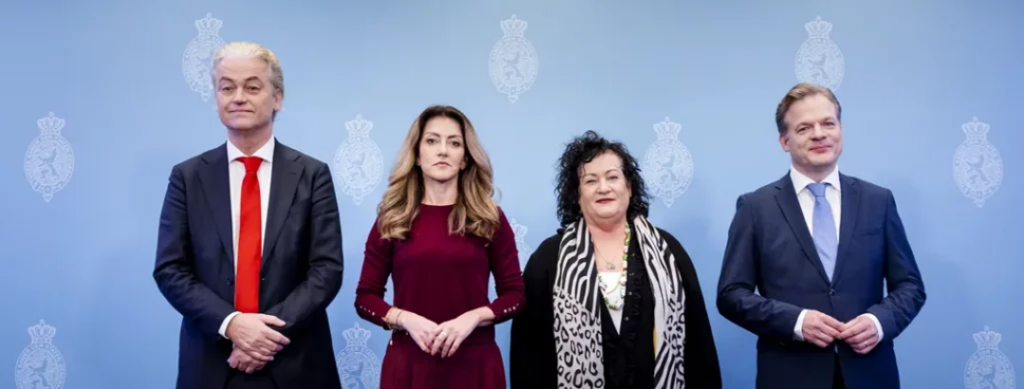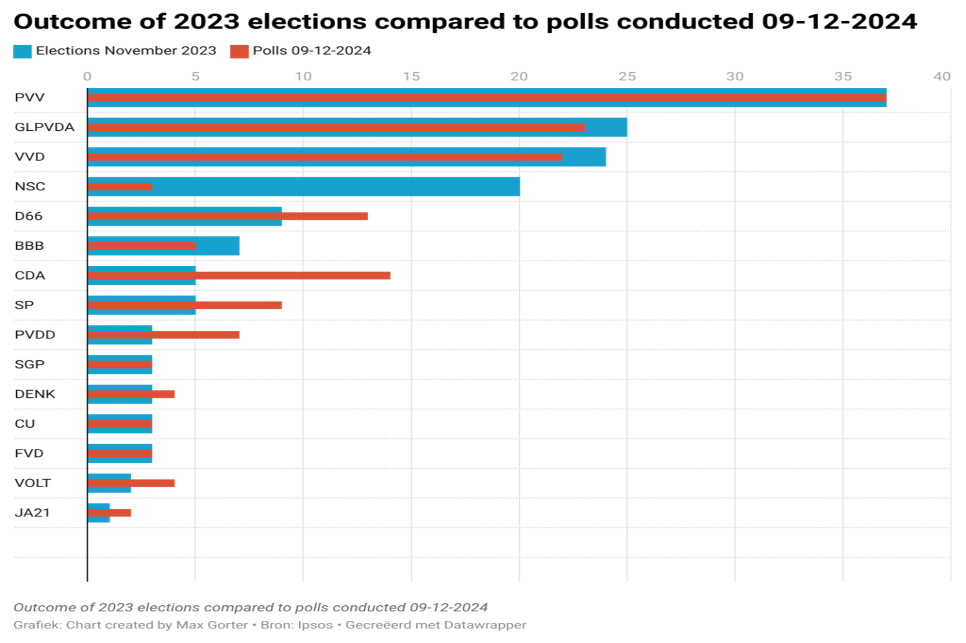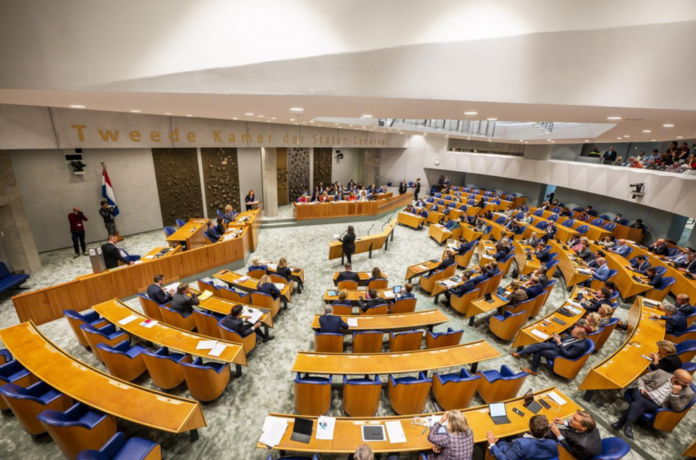It has been a year of political unrest in The Netherlands. For the most right-wing cabinet since WWII, it has been a challenge to keep everything together. Both the formation period and the time spent in government has been rough. And the question on everyone’s mind is not if the government will collapse, but when.
How did we get here?
The election outcome of 22 November 2023 was a surprise to many. With the government collapse, and subsequent leaving of many prominent party leaders and members, the stage was set for a completely revised political landscape in The Netherlands.
In line with the political mood of Europe, The Netherlands saw a rise of the right wing. The biggest winner was Geert Wilders and his Party for Freedom, PVV. Wilders’ rhetoric can best be described as Islamophobic, anti-immigration, and populist. But by toning down the language, and seeking a more moderate position towards other parties, the PVV became the biggest party, with 37 seats out of 150. Wilders, as election winner, started to seek out coalition partners. Wilders eventually sought to create a government with the VVD, BBB, and NSC.

The VVD is the liberal party of The Netherlands. The VVD has been in government for 4 consecutive terms. With Mark Rutte stepping down, the VVD sought new leadership in Dilan Yeşilgöz. BBB, also known as the farmers party, is a small but very popular party that gained massive popularity with the farmers protests in The Netherlands. Their principal goal is to protect farmers, who have felt underrepresented in the past, especially with new EU rules aimed at reducing emissions. Lastly, NSC, New Social Contract, joined the elections as a new party, having split off from the Christian Democrat party CDA. Their leader, Pieter Omtzigt, had been very popular leading up to the elections, taking away support from the CDA, which had previously been a standard member of any coalition. NSC is mostly focused on ‘good governance’. Party leader Omtzigt has generally been known as not particularly charismatic but very stern, attentive to details, and thorough.
The formation
While the parties are all right-leaning, to say that the parties were on friendly terms, could not be further from the truth. Even before the parties could get around the table it was clear that PVV (37), VVD (24), and NSC (20) held fundamentally different opinions on some core issues. BBB (7), befitting its role of a small party, attempted to keep peace, but this was often challenging. Party leaders would leave negotiations on multiple occasions. Meanwhile social media became a place where grievances were made clear, and trust was challenged.
In The Netherlands, it is generally understood that the party that wins the elections, will see its leader become Prime Minister. However, to keep negotiations alive, it was decided that Geert Wilders would not become the next Prime Minister. All party leaders would remain in the parliament, rather than becoming cabinet ministers, which is usually the case. Eventually, an outsider was chosen to become the Prime Minister, and representative of The Netherlands. Dick Schoof, who before worked as a prominent civil servant in the justice department, was asked to take on the top job. A relatively unknown, and party-less Prime Minister.
The government
So, despite a rough formation period, in which there were multiple moments of serious doubt and possible re-election, the new government was formed on July 2nd, 2024. It immediately became clear that the issues were far from done. Only the VVD had ever been this big and part of the government. That the other parties lack in experience and in human resources became clear, even before the cabinet was officially inaugurated.
The coalition accord included the creation of a ministry of asylum and refuge. Their first choice for minister for this post eventually did not pass the mandatory screening by the security service. The replacement was Marjolein Faber. She immediately made headlines with some controversial past and present statements. It was found that she used the term ‘omvolken’ which means population replacement. This term is derived from a conspiracy theory that suggests the replacement of white people by various non-white foreign people. The term is used by white supremacists and is often tied to the rhetoric of Nazism.
While other cabinet members are not as controversial, there does exist a general unrest within the government. The overall issue is clear, inexperience and incompetence. Ministers and staffers are leaving the government, and each political crisis could be the last. But where lies the issue?
Looking ahead
When looking at current polls, we see something surprising. The PVV, VVD, and BBB remain around as large as they currently are. While the BBB and VVD lose one or two seats, the PVV is set to keep its 37, and could even gain a few more. The big loser is the NSC. Their 20 seats have diminished to 3, and some polls even suggest NSC will lose all its seats if elections were announced soon. Polls conducted near the end of December 2024 show a rise for the CDA (Christian Democrats) and D66 (Social Democrats). This is not a surprise, as supporters for these parties opted to support NSC’s Pieter Omtzigt in the 2023 elections.

With the polls in mind, we can say that voters have lost their faith in Omtzigt and his party. Many believe that NSC presents a roadblock for good right-wing governance in The Netherlands. Internally, NSC also seems the most problematic. As a new party, their inexperience has made them the least effective. As such, those previously mentioned ministers and staffers that left the government have mostly been from the NSC.
Will there be elections?
The big question remains, will there be elections or not? The simple answer is yes. While the cabinet has survived a number of cabinet crises, in which a potential collapse was nearly certain, it is only a matter of time before a collapse will occur. Geert Wilders has already made it clear that he will accept no further amendments to the new plans for asylum and immigration. A full cabinet meeting on these plans is scheduled for the 20th of December, and Wilders’ strong words suggest that too many changes will lead him to let the cabinet crash. It could however be another extension of the inevitable.
By Max Gorter



